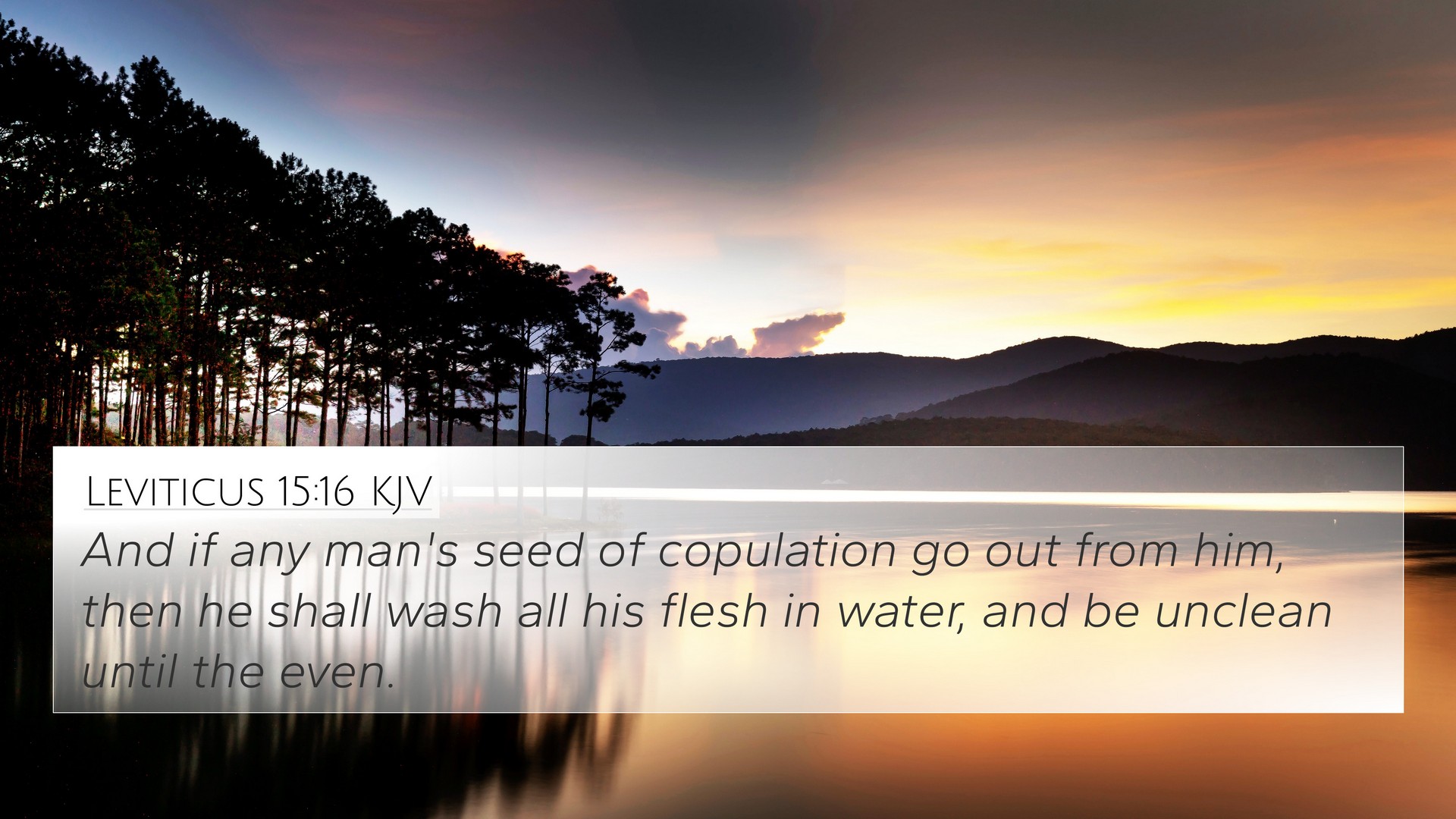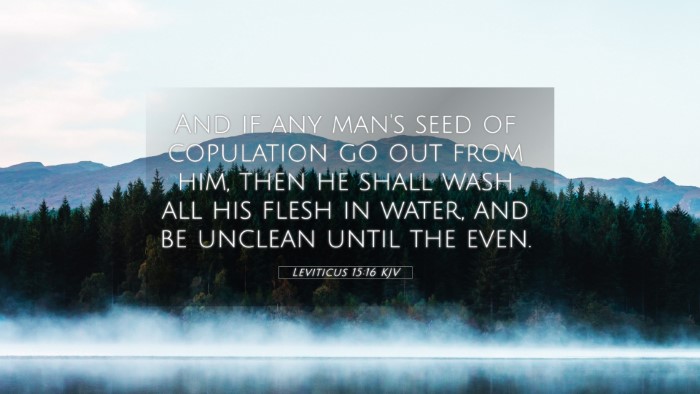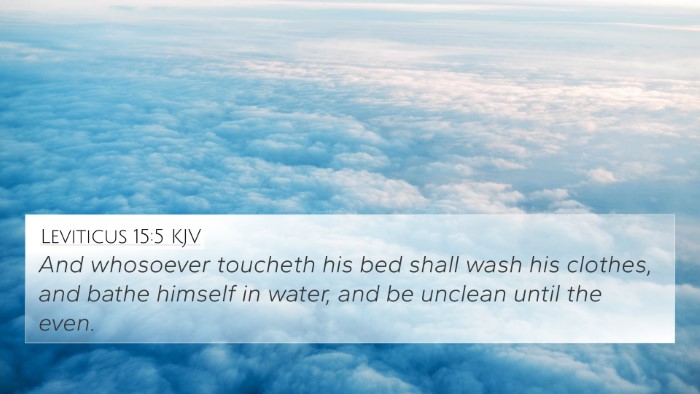Meaning and Interpretation of Leviticus 15:16
Leviticus 15:16 presents a significant aspect of ancient Hebrew law regarding purity and ritual cleanliness. The verse states:
“And if any man has an emission of semen, then he shall wash all his flesh in water and be unclean until evening.”
Overview of the Verse
This verse outlines specific rules concerning ritual purity relating to bodily emissions. According to the cultural and religious context of ancient Israel, maintaining ritual cleanliness was of utmost importance for social and religious practices. Understanding this verse is essential for comprehending the broader themes in Leviticus and the significance of the law.
Commentary Insights
Matthew Henry's Commentary
Matthew Henry emphasizes that this law identifies a natural occurrence—a man’s emission of semen—which, though normal, rendered him ceremonially unclean until the evening. It highlights the necessity for both physical and spiritual purity. Henry points out that such regulations taught the Israelites about the seriousness of holiness and the importance of cleanliness in approaching God.
Albert Barnes' Notes on the Bible
Albert Barnes further explains that this command serves to maintain a distinct separation from pagan practices that often disregarded such matters. Barnes notes that the specificity in the law helps mitigate any potential impurity from affecting worship practices. He highlights that the cleansing process signifies acknowledgment of sin and the necessity of purification to stand before God.
Adam Clarke's Commentary
Adam Clarke elaborates on the practical implications of this law. He notes that the washing symbolizes a fresh start and a return to a state of purity. Clarke indicates that societal norms surrounding purity impacted both personal behavior and community relations, as individuals affected by such emissions were often isolated until they could be restored to cleanliness.
Bible Cross-References
To fully appreciate Leviticus 15:16, it is beneficial to explore its connections with other scriptures. Here are several related verses:
- Leviticus 11:47 - Discusses the concept of clean and unclean animals which sets the tone for understanding purity.
- Leviticus 15:2 - Outlines other instances of bodily discharges and their implications for ritual cleanliness.
- Numbers 19:11-13 - Offers additional cleansing requirements following contact with the dead, reinforcing the theme of purity.
- Hebrews 13:4 - Connects the sanctity of marriage, hinting at the broader implications of sexual purity.
- 1 Corinthians 6:18-20 - Addresses sexual immorality and the importance of honoring God with one's body.
- John 3:5 - Jesus teaching on the need for spiritual rebirth, relating the physical to the spiritual.
- Matthew 5:8 - “Blessed are the pure in heart, for they shall see God,” emphasizing inner purity.
- Romans 12:1 - Calls believers to present their bodies as living sacrifices, holy and pleasing to God.
- Ephesians 5:3 - Suggests that sexual immorality should not be named among God's holy people.
- 1 Peter 1:15-16 - Encourages believers to be holy, as God is holy, reinforcing the ongoing theme of divine holiness.
Thematic Connections
Thematically, Leviticus 15:16 contributes to a larger narrative in the Bible concerning the concepts of purity and holiness. The laws regarding cleanliness serve as a precursor to Christ’s teachings on internal purity and moral cleanliness. The transformation of these ancient laws into New Testament principles showcases the continuity of God's expectations from His people. By examining these connections, believers can better understand how such verses resonate throughout the entirety of Scripture.
Practical Applications
An understanding of this verse, along with its cross-references, can aid in various contemporary applications:
- Personal Reflection: Engaging with the idea of purity can lead to self-examination regarding one’s thoughts, actions, and lifestyle choices.
- Community Standards: Recognizing communal implications of purity can foster discussions about accountability and holiness within a faith community.
- Biblical Study and Exegesis: Utilizing tools for Bible cross-referencing enables deep dives into themes that traverse both the Old and New Testaments.
- Sermon Preparation: Scholars and pastors can use connections drawn from this verse and its parallels to reinforce messages of holiness within their congregations.
- Encouragement of Rituals: Understanding these laws may encourage modern believers to adopt practices that affirm their commitment to God, such as regular cleansing through confession and prayer.
Conclusion
Leviticus 15:16 serves not only as a historical legal directive for ancient Israel but as a timeless reminder of God’s call to purity and holiness for His people. Its interconnectedness with other Bible verses enriches the understanding of spiritual cleanliness and the importance of maintaining a life that reflects God's glory. By studying these valuable insights, believers can deepen their faith and live in a way that honors their Creator.








